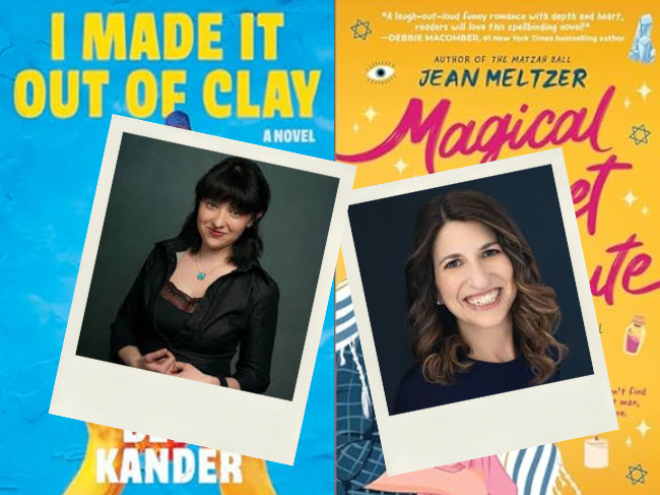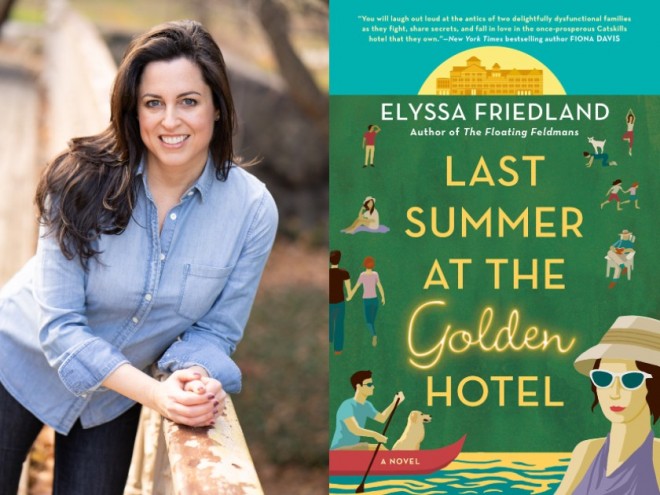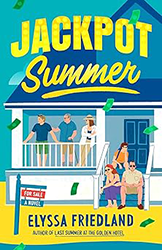
Elyssa Friedland’s author photo by Brian Marcus
Jean Meltzer’s author photo by Lisa Damico
Elyssa Friedland and Jean Meltzer, authors of the forthcoming novels The Most Likely Club and Mr. Perfect on Paper respectively, discuss modern romance, the power of female friendships, and mental health struggles through the lens of Judaism.
Elyssa Friedland: Jean! This feels very bashert to me that we’re interviewing each other. I remember my good friend and book champion Andrea Katz of Greats Thoughts, Great Readers Facebook group telling me I had to read The Matzah Ball. I always listen to Andrea and I’m grateful she introduced me to your work. I fell in love with your debut and now I’m doubly in love after reading your sophomore novel, Mr. Perfect on Paper.
Jean Meltzer: I feel the same exact way about you! I’ve been a big fan of your work since The Floating Feldmans. I was so honored to have the opportunity to read your latest book, The Most Likely Club. One of the things that struck me as I was reading your latest book was how perceptive you are at writing characters. Where did you draw the inspiration for Melissa, Priya, Tara, and Suki? Also, I would be completely remiss if I did not ask you this — did you receive a senior year superlative, and did it come to fruition?
EF: I’ll start with my superlative. It is so random! I was part of a quartet deemed Most Likely to be the cast of Seinfeld. I’m sure you remember how popular that show was in the 1990s. I even hosted a viewing party for the finale at my house. I was the Elaine character, which I take as a huge compliment; she’s funny, smart, and works in publishing. And we both have black, curly hair. I was close friends with these three boys in my class who did resemble — at least in personality — Jerry, George, and Kramer and so the four of us posed together in the yearbook as the Seinfeld cast.
As for the four main characters in The Most Likely Club, I started with Melissa and built her friends around her. Melissa was someone I could see very clearly from page one; she was the president of everything, the person who does all the work in the group project, and who can’t get enough accolades. But she’s not always lucky, and I do believe luck plays a significant role in success. She’s scrappy and hard-working, and as a single mom she never loses faith in a more promising future. Tara I saw as somewhat of a tough girl who doesn’t fit the image her parents have of her and yes, she can’t break free from them even as an adult. I know many people in that situation. Priya is the brain, because you gotta have a brainy one in the group. And her marriage most resembles mine. She has a lovely husband, but he’s gotta do more housework! And Suki is the most enigmatic. I liked that she didn’t fit it into any of the traditional high school labels.
I loved reading about J‑Mate, the Jewish dating website your protagonist Dara created in Mr. Perfect on Paper. Before getting married, were you on J‑Date? As a romance writer, how do you feel about meeting through apps? Your book’s title makes it clear that chemistry and resumes don’t always align, and yet many people have found successful matches online.
JM: I was on every dating app I could find! Seriously. I didn’t get married until I was thirty, and I’m pretty sure I dated every single Jewish man in Manhattan before I eventually found my husband.
I did not meet my now-husband on a dating app. We met on a cruise while I was in rabbinical school. He was an engineering student and Army Reservist on a family vacation before his second deployment to Iraq. He was also (plot twist!) not Jewish. This real-life experience — the idea that you could be deeply committed to your Judaism, but fall in love with someone outside of your faith, despite all your best intentions not to — became the inspiration for my sophomore novel, Mr. Perfect on Paper.
I don’t have any problems with dating apps. What many people may not realize about me, and about the stories I write, is that I believe — wholeheartedly and completely — in the Jewish idea of bashert. I believe there is a lid for every pot, and that God cuts and designates a soul for most every person. I think anything that facilitates a person finding their bashert is a useful and beneficial tool.
Speaking of bashert, I loved the closeness these four women share in your book. As someone who has also had the same group of friends since I was eight-years old, there is something truly comforting about knowing someone through your most awkward years. What made you want to write a story about female friendship, high school, and do you have your own “most likely club” rooting for you in your life?
I believe in the Jewish idea of bashert. I believe there is a lid for every pot, and that God cuts and designates a soul for most every person. Anything that facilitates a person finding their bashert is a useful and beneficial tool.
EF: I love hearing you speak about your personal romance. I have the chills! As for my choice to focus on friendship, it was a natural outgrowth of my previous two books where I focused more on family. I get bored as a writer and like to challenge myself with each new book. So I decided to focus on friendship — specifically among females — for my fifth novel. I do believe friendship between women can be complicated and there are natural pangs of jealousy that exist between friends, whether we like to admit it or not. But I also believe that there is no one more satisfying to talk to than an old girlfriend. I love my husband very much, but there are things he just doesn’t get in the way a female friend does. I’m also intrigued about how friendships evolve over time when people’s lives take divergent paths, as children, spouses and careers come into the picture. And now with social media, there’s an added layer of complexity to friendships. I definitely have a “most likely club” rooting for me. I really live for my girlfriends. They bring me so much joy and laughter, and texting with my ladies on a daily basis keeps me upbeat and feeling connected. Most of these women I met after having children, but there are a few friends from high school that I keep in touch with and there’s nothing like reminiscing together.
What made you want to write about Generalized Anxiety Disorder? There’s a lot to be said, and has been said, about the connection between anxious people and successful people. What does Jean Meltzer have to say about it?
JM: Simple. I have it.
One thing that is important to note — there is a difference between anxiety and Generalized Anxiety Disorder. GAD can be extremely disabling. There is nothing positive about having panic attacks at three o’clock in the morning. Or avoiding getting on an airplane for your entire life, missing out on weddings or seeing the world, because of the remote possibility you may crash. This is when anxiety spirals out and begins controlling your life. But you’re correct that anxiety is not always negative. Anxiety propels us to lock our doors at night, complete our assignments, double check the road before we cross it. Anxiety, when focused in the right ways, can yield many positives.
I could say so much about anxiety, but the most important thing I wanted to get across in my book was that no one should be ashamed of their mental health challenges. In this way, the heroine of my story reflects my own journey. Like the main character, I am the daughter (and sister!) of a psychologist. My mother also always treated my own mental health challenges the way you would a skinned knee — with no judgements attached.
I also knew a ton of people with anxiety growing up, and that familiarity with others normalized the experience for me. Then, there was becoming an adult, and understanding my Jewish history more fully. I began to see my own anxiety as the very normal byproduct of Jewish transgenerational trauma. It was the result of our people surviving antisemitism, expulsions, pogroms, and the Holocaust. It was from strength and resilience that my anxiety formed.
I know that the way I feel about mental illness is not the norm. But I wanted to extend this way of reframing to any reader who may be struggling. The one thing I try to get through in all my books is that there is no reason, at all, why anyone should be ashamed of any diagnosis. Shame keeps people from getting help. My hope is that my book gives someone courage who needs it.
Your book also deals with struggles beautifully. When we meet your characters in the present-day, all of them are struggling. Some characters struggle in their interpersonal relationships, unable to communicate their needs to their spouses, children, or partners. Some have given up on their goals. Or, have no idea where to start in achieving them. At some point in the story this changes, and the women move from a place of complacency into fighting for their dreams. What message were you hoping readers take away from watching these four women shift their perspective?
EF: Thank you for sharing about your GAD. I wholeheartedly agree with your perspective on mental illness and wish it was the pervasive way of thinking.
The women in my book are all struggling. We meet them at difficult points in their lives. They are struggling professionally and in their personal relationships. They also must manage the daily struggle of getting errands done, which I believe is a pitfall that affects women about a thousand times more than men. It can be difficult to focus on a larger goal, like changing jobs or evaluating your marriage, if you’re busy every second of the day folding laundry and running out for milk. I truly mean this. There are days when my life is so busy with minutiae that I can’t even find five minutes to make a decision about something that actually matters, like — do I want to write another book? Which high school is the right fit for my oldest child? Instead, my head is clogged with worrying that I didn’t send in the payment for my daughter’s volleyball uniform in time.
The reunion is something of an inflection point for the women. They step out of their routines and have space to analyze their lives in a way they don’t often do. Plus being around their high school friends reminds them of the promise they once held — the optimism and determination that got lost in the grocery list, or put away because of one too many disappointments. I want women to take the time to think about longer term goals, to not get lost in to-do lists, to realize that it’s far more important to evaluate their happiness than to make sure the fridge is stocked. I also want women to take away the message that it’s never too late to make changes. Some of the happiest women I know are the ones who went to law school in their forties or ended a bad marriage even though they were still raising small children. These decisions can only be made if you give yourself the mental space to think carefully, not in the supermarket aisle.
Dara has very strong views about her religion. Do you worry about offending people who have different views about religious practice and intermarriage than Dara does, even though she’s a fictional character?
JM: No. LOL.
Listen, I work extremely hard not to offend anybody in my books. I try to be as gentle as possible in my choices, and I always write to the goodness of the world. But, you shouldn’t be an author if you aren’t willing to be courageous.
There are a lot of wonderful romances out there, with Jewish and non-Jewish characters, who have unproblematic interfaith romances. They are pleasing, well-written, and don’t remotely risk alienating someone. In fact, many readers of romance actually prefer this type of book. A romance that doesn’t get too real. A romcom that allows them to escape into a fantasy of love and life. I totally get that, and those types of interfaith stories should and do exist.
But — as a Jewish woman from an observant family, who was in rabbinical school when she fell in love with a non-Jewish man — that wasn’t my experience.
There are so many people out there whose stories have never been told. In romance, we only have a handful of traditionally published Jewish stories. When you start veering into stories of observant Jews — or observant Jews who don’t want to leave the religion — that number gets even smaller. But not every book is for every reader. My only goal is to write honestly and lovingly from the Jewish worldview I know.
You strike me as an author who also writes with courage. One of the things that really struck me while reading The Most Likely Club was this underlying theme that men are often responsible for derailing the plans of women. Sometimes this derailing was unintentional, such as a woman taking all the emotional labor in her relationship. Sometimes it was not, as in the case of another character who is sexually assaulted. I was wondering if this idea of derailing was deliberate on your part, and what — if anything — you would like to say about it?
The reunion is something of an inflection point for the women. They step out of their routines and have space to analyze their lives in a way they don’t often do.
EF: I didn’t set out to make the men the villains of my book, but it sort of worked out that way. I think in the case of Priya, where she and her husband have the same job but she is doing almost all of the household labor, her husband isn’t a traditional villain. He is emblematic of a pattern in many households where the mother, for whatever reason, bears more responsibility than the father. This is often called the “mental load” and it’s something I struggle with at home. Writing The Most Likely Club pushed me to be more courageous. Like Priya, I started demanding that my husband take a bigger share of the family pie. I’m lucky that he was very amenable and understood my frustrations, but it’s still a work in progress!
Tara’s story is different. She was on the path to becoming a professional chef/restaurateur when her boss assaults her. There’s no gray area here, only a clear villain. I was inspired to write this storyline because of the endless stream of headlines stemming from the MeToo movement. Men taking advantage of women is a serious problem, and even if it doesn’t take the form of an actual assault, there are countless subtle ways that men make women uncomfortable at work. I have heard way too many stories from my girlfriends, especially those who work in finance.
But I do want to say not all men are bad in the book! How awesome is Nathan? I love that guy.
JM: I adored Nathan! And as a romance writer, I completely swooned at the idea of someone getting their happy ending. Speaking of endings, and before we say goodbye, what are you working on next?
EF: I have my first picture book coming out in February of next year. It’s calledThe Museum of Lost Teeth and answers the question: Where do the teeth go after the tooth fairy collects them? I’m really excited to publish a picture book. It’s a new world for me and, as I said above, I get bored easily so I like new challenges and experiences. I’m also a teacher and my class at Yale starts in a month so I am busy preparing for that. And I signed on to write two more novels. Yikes. Writing that all out just gave me a stomachache. Oy!
What are you working on?
JM: I’m currently working on my third book, Kissing Kosher. It’s about the heir to a kosher baked-goods empire who goes undercover at a family-owned kosher bakery in order to steal their world-famous pumpkin-spiced babka recipe. But when garnering the secret recipe means drawing closer to the granddaughter — a woman dealing with sexual dysfunction due to chronic pelvic pain — both are left wondering if they’ll ever find the right recipe to fall in love. Like all my books, it will be super-Jewy, unapologetically joyful, and chronically-fabulous. Kissing Kosher will be out in August 2023. After that, I’m thrilled to be writing two more books.
Elyssa Friedland is the author of five adult novels and teaches creative writing at Yale, from which she graduated. She also holds a J.D. from Columbia Law School. The Museum of Lost Teeth is her first picture book. She lives in New York City with her husband and three children.
Jean Meltzer studied dramatic writing at NYU Tisch and has earned numerous awards for her work in television, including a daytime Emmy. She spent five years in rabbinical school before her chronic illness forced her to withdraw, and her father told her she should write a book — just not a Jewish one because no one reads those. The Eight Heartbreaks of Hanukkah is her fifth novel.



